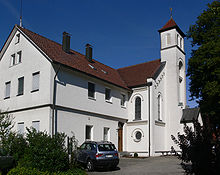Paul Knapp (pastor, 1879)
Paul Knapp (born April 15, 1879 in Tuttlingen , † July 28, 1953 in Grünkraut near Ravensburg ) was a German Protestant pastor and pacifist . In 1918 he founded the short-lived German Peace Party .
Life
Knapp was born as the son of the Protestant pastor Gotthold Knapp in Tuttlingen, his grandfather was the pastor, song poet and pietistic writer Albert Knapp . While he was studying theology in Tübingen , he developed a critical attitude towards his church, but nevertheless decided to serve the regional church as vicar and later as pastor.
From 1911 he was pastor in the remote Upper Swabian village of Grünkraut and the local parish of Atzenweiler.
During two short stays in the medical service in hospitals during the First World War , his rejection of war solidified. He took the view that prayers and thanksgiving services related to the war were blasphemy . In addition, he publicly expressed pity for the "lovely, splendid Russians who perished in the Masurian lakes ". As a Protestant pastor, he expressly welcomed the peace efforts of Pope Benedict XV in 1917 . With his public lectures, he drew sharp criticism from the church leadership. The Württemberg regional church let him go anyway, because it was of the opinion that a disciplinary measure would only bring additional attention and sympathy to the pacifist from the remote diaspora community . However, the numerous transfer applications he had submitted were all rejected.
In 1918 he founded the German Peace Party in Ravensburg . In addition to the local club in Ravensburg, other local clubs were formed in Stuttgart , Tübingen and Sigmaringen . The attempt to get the German Peace Society to support the German Peace Party failed because it was of the opinion that it was better to promote a pacifist line within the existing parties. In 1919 the party dissolved again.
From the 1920s onwards, Knapp held back on party politics, but did not deviate from his views. Right from the start, he faced National Socialism with resolute rejection. In 1949 the church leadership put him into retirement.
Publications
- Necessity and manner of communicating the sure results of modern theology to the congregation and students. Stuttgart 1910
- The evangelical man. Atzenweiler 1932
- What is truth 1939
Quotes
"The battlefield is a field of shame"
Footnotes
- ↑ quoted from Glaser, p. 79, see under literature
literature
- Stephan Glaser: Paul Knapp. Pastor, pacifist, politician. Filderstadt 2003, ISBN 3-935129-08-4
Web links
| personal data | |
|---|---|
| SURNAME | Close, Paul |
| BRIEF DESCRIPTION | German Protestant pastor and pacifist |
| DATE OF BIRTH | April 15, 1879 |
| PLACE OF BIRTH | Tuttlingen |
| DATE OF DEATH | July 28, 1953 |
| Place of death | Grünkraut near Ravensburg |
